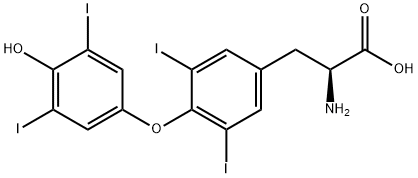51-48-9
 51-48-9 結構式
51-48-9 結構式
基本信息
O-(4-羥基-3,5-二碘苯基)-3,5-二碘-L-酪氨酸
2-甲狀腺素
D-ALPHA-生育酚
左旋甲狀腺素
L-Β-(3,5-二磺-4-羥基苯氧基)-3,5-二磺苯丙氨酸
左甲狀腺素
甲狀腺素
3,5,3',5'-四碘甲[狀]腺胺酸
3,3\',5,5\'-四碘-L-甲腺原氨酸
(S)-O-(4-羥基-3,5-二碘苯基)-3,5-二碘酪氨酸,(S)-O-(4-HYDROXY-3,5-DIIODOPHENYL)-3,5-DIIODOTYROSINE
L-3,5,3',5'-四碘甲狀腺原氨酸
甲四碘安,LEVOTHYROXINE
3,3',5,5'-TETRAIODO-L-THYRONINE
3,3',5,5'-TETRAIODO-L-THYRONINE SODIUM SALT
3,5,3',5'-TETRAIODO-L-THYRONINE
l-2-amino-3-[4-(4-hydroxy-3,5-diiodo-phenoxy)-3,5-diiodo-phenyl]-propanoic acid
LEVOTHYROXINE
LEVOTHYROXINE SODIUM
L-THYROXIN
L-THYROXINE
L-THYROXINE NA
L-THYROXINE SODIUM
L-THYROXINE SODIUM SALT
O-(4-HYDROXY-3,5-DIIODOPHENYL)-3,5-DIIODO-L-TYROSINE
(S)-2-AMINO-3-[4-(4-HYDROXY-3,5-DIIODOPHENOXY)-3,5-DIIODOPHENYL]PROPIONIC ACID
T4
TETRAIODOTHYRONINE, NA
THYROXINE
3,5,3’,5’-tetraiodothyronine
beta-[(3,5-diiodo-4-hydroxyphenoxy)-3,5-diiodophenyl]alanine
l-3,5,3’,5’-tetraiodothyronine
物理化學性質
安全數(shù)據(jù)
應用領域
| 報價日期 | 產品編號 | 產品名稱 | CAS號 | 包裝 | 價格 |
| 2025/02/08 | HY-18341B | L-甲狀腺素 L-Thyroxine sodium | 51-48-9 | 500mg | 650元 |
| 2025/02/08 | HY-18341B | L-甲狀腺素 L-Thyroxine sodium | 51-48-9 | 10mM * 1mLin DMSO | 715元 |
| 2025/02/08 | HY-18341B | L-甲狀腺素 L-Thyroxine sodium | 51-48-9 | 1g | 850元 |
常見問題列表
|
Human Endogenous Metabolite
|
Deiodinases (DIOs), which catalyse the conversion of thyroxine (pro-hormone) to the active thyroid hormone, are associated with thyroid stimulating hormone (TSH) levels. DIO1 and DIO2 catalyze activation of thyroid hormone secretion in contrast to DIO3 playing role inactivation of the secretion. Activities of DIO1 and DIO2 play pivotal role in the negative feedback regulation of pituitary TSH secretion. L-Thyroxine (T4) and Triiodothyronine (T3) hormones are known to modulate the expression of ionic channels, pumps and regulatory contractile proteins. Moreover, thyroid hormones have been shown to influence calcium homeostasis and flux responsible for excitation and contractility, with L-Thyroxine and Triiodothyronine modulating its pharmacological control and secretion. In rats fed 12 weeks with the iodine-free diet, a significant decrease in the levels of both Triiodothyronine and L-Thyroxine is observed when compared to the control group fed with standard diet (p<0.001). In the group treated with low doses of L-Thyroxine, an increase in L-Thyroxine levels is observed (p=0.02) while Triiodothyronine levels remain virtually similar to the control group (p=0.19). Rats treated with high doses of L-Thyroxine display a significant increase in both Triiodothyronine and L-Thyroxine circulating concentrations compared to the non-treated hypothyroid group (p<0.001 and p=0.004, respectively) and a significant increase in L-Thyroxine levels when compared to the control values (p=0.03).


